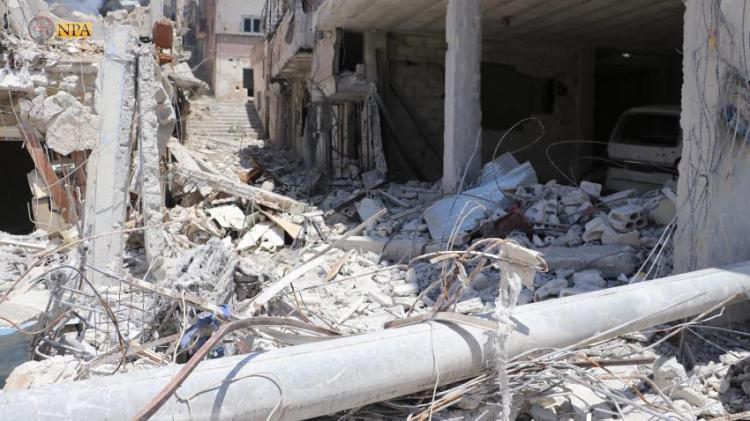Turkish weapons been deployed against Russians in Idlib, as Russia denies sending troops to the region
Idlib – North-Press Agency
Syrian armed opposition groups have confirmed that “Arms supplies including anti-tank guided missiles from Turkey have inflicted heavy losses on the Russians and their allies and have even repulsed ground attacks.”
This came just before the Russian Defense Ministry denied in an official statement, the validity of news that spread regarding sending military reinforcements of its ground forces to the fronts of Idlib in northwestern Syria.
False allegations
Moreover, the Russian Defense Ministry stressed that these “allegations” about the participation of Special Forces and Russian ground forces in the battles of Idlib are false news, pointing out that it’s not the first time that such “allegations” were published, according to Russian media sources.
The denial mentioned above follows statements by Jamil al-Saleh, the commander of Jaysh al-Izza, and Naji Mustafa the spokesman of the Turkish-backed National Liberation Front (NLF), about Russian participation in ground forces in the battle of Idlib in an interview with Reuters.
Naji Mustafa said: “These special Russian forces are now present in the battlefield. The Russians are intervening directly now, when (Syrian President Bashar) al-Assad’s forces failed to advance, Russia then intervened directly, after bombing the area with more than 200 sorties”.
Border visit
Turkish Defense Minister Hulusi Akar said, during a visit to the Turkish forces on the borders with Syria, that the attacks of the Syrian government forces within the de-escalation zones: “Raise tensions and undermine peace and stability”.
Akar pointed out that “nearly 400,000 people have been displaced,” due to the Syrian government attacks, stressing on what he called “the need to stop the regime’s progress in the de-escalation zones and withdraw to its previous points within the framework of the agreement”.
Renewed escalation
These statements coincide with the continuous and renewed escalation on a daily basis targeting various areas of the governorates of Idlib, Aleppo, Latakia, and Hama, which causes further displacement, destruction, and killing.
As the armed opposition groups targeted, on Friday, areas in the town of Muhradah, which is under the control the Syrian government forces, following a calm prevailed in the de-escalation zones and its surroundings.
Meanwhile, the Syrian fighter jets targeted in Thursday midnight areas in Maarzita, Ma’aret Hurmah, Kafar Sijnah, and Jisr al-Shughur west and southern Idlib, without any information about casualties, while one person died of his wounds as a result of the artillery bombardment by the governmental forces on the area of Kastoun in al-Ghab Plain.
Reinforcements, threats, and interests
The armed opposition groups have talked about bringing military reinforcements to the frontlines with the government forces to reinforce their positions, while fears of a new military campaign by the Syrian government forces are underway in the coming period.
On the other hand, the Turkistan Islamic Party (an armed Uyghur Salafist jihadist group) has threatened to target the Syrian government forces held areas, as the party’s leader vowed via an audio recording broadcasted on the Internet, by saying: “We will turn the Assi river (Orontes) into a river of blood, and al-Ghab plain would be the largest mass grave for the Russians and Nusairis (a term used referring to the Alawites) tyrants”.
Meanwhile, the Russian Foreign Minister Sergey Lavrov revealed discussions regarding solutions related to the Idlib region in a way that “does not harm civilians there,” stressing that “the terrorists who are there must be eliminated”.
“We cannot tolerate infinitely with tens of thousands of extremists linked to al-Qaeda in the de-escalation zones in Idlib, and at the same time we will look for a solution that does not harm the civilian,” Lavrov said.
Lavrov hinted”; Eliminating the terrorism in Syria is in the interest of the European Union because it will reduce the level of terrorist threats coming from the region and reduce the flow of migrants”.

